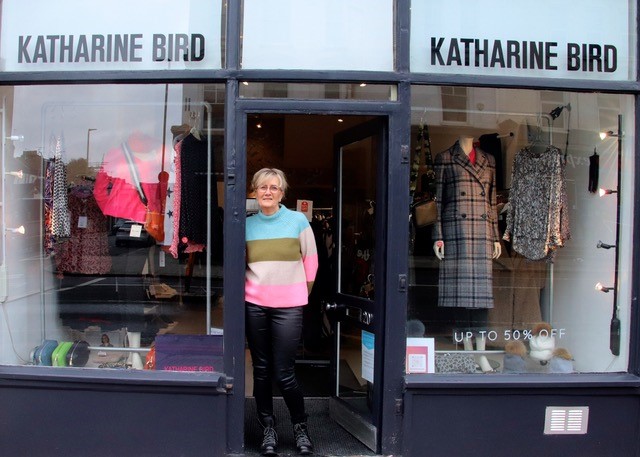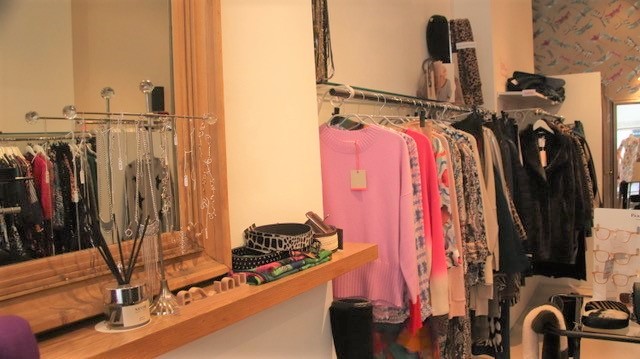Corona Impact Series: How a small Wandsworth womenswear boutique embraced click-and-collect

In this series, City A.M. looks at the financial and economic impact of the ongoing pandemic on a range of small and medium-sized businesses across London. This week: how a small Wandsworth womenswear boutique is bouncing back from the third lockdown thanks to the world wide web.
Pre-pandemic, independent stores were thriving – popping up on local high streets in abundance offering everything from hand-crafted products, designer clothing and ethically sourced goods.
Fast forward to 2021 and the impact of the third national lockdown is visibly taking its toll, with many already unable to survive the strain.
Wandsworth is home to many once-thriving boutiques and independents, including Katharine Bird, a designer womenswear store situated on Battersea Rise.
For more than three decades, Kate Bird has been trading purely from her bricks and mortar store, never needing to use digital platforms to sell her products due to her emphasis on customer relationships and word of mouth.
“We source tailor-made products for our loyal clientele and have always prided ourselves on exceptional customer service, we genuinely love interacting with our customers, so we have never had the desire, or need, to sell online,” Bird shared with City A.M.
Since 1989 – when Bird originally opened as part design studio and part shop – she has diversified her product offering to keep in line with changing shopping habits and fashion.
Originally selling business suits and occasion wear, Bird now buys in a large variety of clothing, similar to that of a small department store.
“I have sold to Royalty as well as many TV presenters and celebrities over the years. We have known some of our customers for decades and seen their children grow up and get married themselves, we really do have special relationships with them,” Bird said.
“Many have moved out of London over the years, but they still come back to us and we will even buy for them in mind each season. We have been very successful trading from our Battersea store – until the pandemic hit.”
First lockdown
Like many small businesses, Bird relied on government funding from the first lockdown to keep the shop afloat and continue paying for rent, utilities and her stock.
She also took advantage of the furlough scheme for her four members of staff and continues to do so.
“After more than 30 years of trading successfully without an online presence, we soon realised it was the only way we could continue selling,” Bird said.
“The biggest challenge we were immediately faced with was the large amount of unsold stock just sitting in the shop. We order from around 20 different brands at least six months in advance, so we already had winter 2020 stock in before the first lockdown last year,” she explained.
Faced with a lot of items to shift quickly before the seasons changed, Bird and her team set up a simple online shop and a click-and-collect service for local customers.
Because of the big shift to homeworking as the pandemic began, Bird decided to focus on more of the store’s casual wear, a small sample of what customers would find in the shop, as a start to the business’ e-commerce venture.
“Online ordering with a click-and-collect service was an important step for us to take after being forced to close our doors. We don’t want to lose our customers and with it being so easy to buy from the big brands online, it was one of very few options we had to keep them coming back,” she elaborated.

Changing shopping habits
With relatively little online brand presence, and Bird and her team keen to keep her ethos on customer service, she turned to the MyStreet app, which was recently launched to support independent retailers through the pandemic by connecting them with potential customers across the UK and allowing them to have direct communication with shoppers.
“As we currently navigate the third national lockdown, we are having to quickly evolve and respond to fast-changing consumer shopping habits,” she continued.
“What this app offered to us is an opportunity to have 1-2-1 conversations with new and existing customers and offer the kind of high-quality service that our customers are used to, just virtually,” Bird stressed.
Moreover, her attention is gradually shifting away from the pandemic as she is now faced with the challenges of Brexit and is having to work more closely than ever with the brands she buys from Europe.
“Many of [these brands] source materials and manufacture from outside of the EU, resulting in tariffs of up to 12 per cent when imported from the EUto the UK,” Bird sighed.
Currently finding her feet in the world of e-commerce, she does not see this changing anytime soon.
“Whilst the impact of Covid on our business has been huge, we are trying to focus on the opportunity it presents for us to grow, as and when we emerge from the pandemic.”
“We have been forced into selling online, [but] we have tried to do this in a way that complements our service and will allow it grow gradually as we continue to put our efforts into virtual customer service,” Bird concluded.